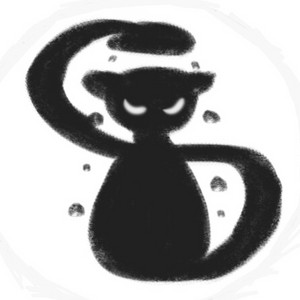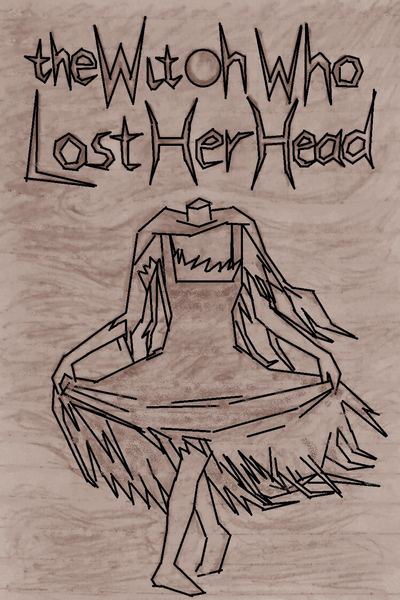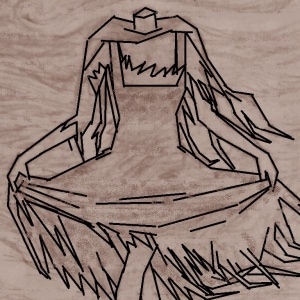It was a bountiful harvest fall, and the folk of Mystvale had reaped sack upon rolling sack of golden grain, that it seemed the roofs of their storages might burst from the pillars. It was a most unprecedented windfall of fortune, the likes of which had not been heard of in these barren lands for years. The profits from this yield ought to keep the town’s finances afloat for a year or two, perhaps with enough yet to privately relieve the mayor’s pockets of his gambling debts—and budget his romantic investments.
Yet although their poor, miserable faces were beaming with gladness, and they sang and danced and made merry under the light of the white warm sun, once the sun itself had fallen, none of the farmers had dared prolong their celebrations into the shadows of the night. Without exception, the townsfolk all scurried back into their cave-like homes, and bolted their doors and windows shut. There was no campfire nor streetlight— one could not even see the tiniest glow from the cracks of the dilapidated buildings. The entirety of Mystvale was deadly silent… for the wight mist had fallen, and the moon was full.
… And wandering the curtained streets of the dark, moonlit town, was the spare, petite figure of a woman.
An intrepid traveler might think to approach her, in hopes of shedding some light onto his understanding, but he would soon realize that something was… not right.
The woman was shorter than he had imagined; she apparently wrapped herself in a shawl, for he could not make apart her head from her shoulders. Slowly, her figure came into view from under the cover of mist, and he wondered what ragged, disheveled clothes she was wearing... Then he realized, with a skip in his heart, that her footsteps had made no sound.
… A mottled, pale hand reached toward him… its arm long, and slender, stretching from all the way up the shawl…
… That was when he realized... that there had been no shawl… that the reason he could not make apart her head from her shoulders, was because…
… Her putrid, decaying body had no head.
•••
‘… And it is said that any soul unfortunate enough to fall into her deadly clutches would be subjected to unspeakable horrors…
‘... For it is the ghost of the beheaded witch, now risen to exact her revenge!’
The excited storyteller slammed the table, and swept the entire tavern with a wide, crazed look.
His audience only responded with subdued reactions, mild surprise and the occasional nod. They had listened with relative attention, but were only making the most of the free entertainment he had provided.
The storyteller sat back down with some marked disappointment in his crowd, and reached for his mug of ale. Some of the drink had spilled when he had rocked the table earlier, and he was bitterly regretting his enthusiasm.
‘... Beheaded?’
This curtly asked the customer in front of him. The customer was fully shrouded in a cloak of black, that had concealed any trace of his personal identity. The only remnant trace of his individuality being an uncommon softness to his rigidly anonymous voice.
He was not only a customer of the tavern, but of the storyteller himself. He had requested the stories of the storyteller, and had been open-minded enough not to call him out for the charity he had offered the other tavern-goers in the cause of advertisement.
It was rather discouraging, however, once the storyteller considered that his customer had also been the least responsive member within the audience. For throughout the session, his dark cloak had not ruffled once. Not to clap or cheer or gasp. Not even to partake of the drink he’d ordered. And this had been the fourth tale.
At least he was paying him.
‘Is something wrong?’ he sipped and said with a sigh.
The black cloak was immobile.
‘... It’s rare… for witches to be decapitated.’
‘That’s what makes the story special!’ the storyteller grinned.
Still no movement. One could possibly feel the silent gaze boring through the darkness beneath the cloak.
‘... I requested a real story.’
‘What, you don’t believe me?’ the storyteller shrugged.
Still no reaction could be elicited from the black cloak, and from its stillness one could sense something ghastly and unnatural, like the spectre haunting the story he had just told. Only, it was comforting knowing ghosts were not like to appear in the midst of so many lively people. Still, the storyteller had to admit it was an unnerving experience.
‘... Is it’—the lightspoken voice rose again, reassuring the storyteller that his customer was, indeed, human.—‘Is the ghost real?’
‘I’ve seen it with my own two eyes.’ He picked up the instrument at his side and gave its string a hearty pluck. ‘Bard’s honor.’
The black customer was silent again, but the bard could tell by years of lip service that the mood was in his favour.
The cloaked head leaned forward.
‘...Where’s Mystvale?’
The bard grinned.
‘Northwestern route. Three, no, four towns from here. Most will have forgotten the place, but the merchant guild ought to keep you on track.’
‘Church adherents?’
A curious detail to be concerned about. ‘...Pagan’, he answered honestly.
‘...’
With a pause and a subtle nod, the black customer reached into his mysterious cloak, and produced a goodly handful of coins. He offhandedly scattered them onto the wooden table with one hand, and made music to the bard’s ears. His other hand nudged forward an untouched mug of ale, and he rose and left without another word.
The bard did not mind. He merely nodded giddily at the surface of the table.
‘What do you s’pose he wanted to know all o’ that for?’ asked the middle-aged waitress, who arrived to refill his ale.
‘Who even cares?’ the bard whistled. ‘Probably just a curious daredevil with too much time on his hands!’
‘You don’t s’pose... he’s from the Church?’ the waitress asked with a tinge of wariness.
The bard waved it off with a scoff. ‘Doesn’t seem like any churchgoer I’ve seen. Rather the opposite!’
His attention wandered onto a little black feather, in the middle of all the coins on the table.
‘...Oi!’ the woman called out girlishly.
‘What is it?’ the bard said with annoyance.
‘So about the stories, are they, you know... real?’
Picking up the ominous feather into his hand, the bard found himself possessed by horrific memories, in a mind no longer preoccupied with professional fervour, or the prospects of tomorrow's meals.
He steadied his shaky grip, and slowly raised his mug of ale, desperate not to spill a single drop.
'Are you okay, mister?' asked the woman with concern.
He looked up to her with a trademark grin.
'...I sure do hope!'
•••
Deep in the northwestern country there was hardly anything beside rocks and mountains. One could tell that with every step along the trail, the verdure was thinning away into a desolate, sand-coloured waste, and it was becoming a wonder why anyone had decided to settle here in the first place. Or even more importantly, to stay.
The black-cloaked traveler contemplated this as he measured the night's chill by the thickness of his cloak, and surveyed the daily scenery through glinting lenses: moorland for miles within sight, bone-grey and wiry as rope; the only signs of human habitation huddled round a sunken hollow on the mountainous terrain. It was like a stagnant puddle, dotted with mosses of greenery that was yet spare and lustless by the standards of another land.
‘... Thy winter wind hath not even blown yet', the traveler whimsically remarked to himself. In winter, all would be draped under a blanket of white, and what few vestiges of life yet visible, tucked into deep, uncertain slumber.
‘...Art thou truly so kind, as to merely not wish thyself an ingrate?’ he mused.
His long cloak fluttered audibly in the wind, as he gazed at the ranges in the further distance, stony and ice-tipped, like the sharpened edges of a saw, or the maw of some ravenous beast.
‘The only compensation is if one were an artist.’
The journey downslope was hard but uneventful, and the traveler kept company with the wailing chorus of wind, to pass his time between each treacherous step.
It was sunfall when he reached the town outskirts. A limp and lifeless scarecrow greeted him in the middle of a field of turnips and pumpkins. The strawman's directions were unwavering, and led along the length of the wooden fences. Two old pillars stood where they ended, humble in spite of their stature before the harshness of nature. A ruined plank of signboard lay forsaken on the dirt, reading, in what had been self-important capitals:
... ‘COME TO MYST’ ...
Like verse from the mouth of an apprentice songman; Mystvale in person was every bit as indigent as it was unformed. The buildings were all old and in alarming states of disrepair. Everything made of stone resembled holes in the wall, and everything wooden patched-up stables. The story said the townsfolk had secured themselves for the following years, but the traveler wondered about the authenticity of the account, or indeed, the standard by which they had measured their supposed security.
Several locals noticed the outsider as he entered, but none, apparently, felt explicit need to hail him. They all frantically scattered about, returning to their little lairs, preoccupied with thoughts of nightfall incoming. There really was no welcome, he thought to himself, recalling the broken signboard. The town’s uncommon absence of any form of hospitality was quite the remarkable thing by itself. A strict pastor might have found it in direct violation of canon law.
But no matter how unusual or irreligious a town or community, there were certain rules it had to comply with, if it wished to remain standing beneath the heavens—compromises it had to make, if it did not want to tumble to the ground.
With this in mind, the black visitor found himself in no time at all before the old chapel at the heart of town, whose cross-topped roofs remained unobscured from any point within town circumference. A wrinkled old man in black was standing in front of the entrance. He came out before the strange arrival, and put his hand upon the halfling stone fence demarcating the estate.
‘State your name and business in Mystvale!’ he demanded in a harsh and stringent voice. ‘Have you not heard what happens here after dark?’
The black visitor was somewhat taken aback by the unsubtle manner of this seeming clergyman. If not by his suit, he would hardly have expected him to be a man of the cloth. But no matter, it spared him the trouble of getting to the point.
He uncovered the hood of his cloak, revealing a mess of dark hair, and beneath it, the mild, bespectacled appearance of a scholar.
‘I’ve come for the ghost.’











Comments (6)
See all